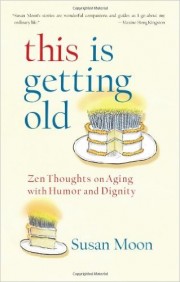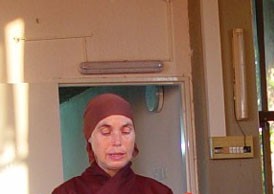 Dans cette collection intime et drôle d’essais sur l’état parfois déroutant, parfois poignant, parfois hilarant d’être une femme de plus de soixante ans, Susan Moon garde son sens de l’humour et l’intérêt de ses lectrices. Parmi les textes inclus figurent un essai sur la gratitude qu’elle ressent pour ses os affaiblis; ses observations sur la découverte en elle-même à la fois d’une orpheline et d’une matriarche après la mort de sa mère; des réflexions sur sa tendance à regretter le passé; des pensées sur la façon de ne pas avoir peur de la solitude; une appréciation pour son garçon manqué intérieur; et des conseils joyeux sur la façon de considérer les «moments de vieillissement » comme des occasions d’être ici et maintenant.
Dans cette collection intime et drôle d’essais sur l’état parfois déroutant, parfois poignant, parfois hilarant d’être une femme de plus de soixante ans, Susan Moon garde son sens de l’humour et l’intérêt de ses lectrices. Parmi les textes inclus figurent un essai sur la gratitude qu’elle ressent pour ses os affaiblis; ses observations sur la découverte en elle-même à la fois d’une orpheline et d’une matriarche après la mort de sa mère; des réflexions sur sa tendance à regretter le passé; des pensées sur la façon de ne pas avoir peur de la solitude; une appréciation pour son garçon manqué intérieur; et des conseils joyeux sur la façon de considérer les «moments de vieillissement » comme des occasions d’être ici et maintenant.
Le livre a été publié en 2010. Susan Moon est une enseignante dans la tradition du Zen.
Commentaire Amazon:
This is the first time I’ve read anything by Susan Moon, and I thought that the essays in this book were very well done. I think they would be enjoyed by anyone, not just people interested in Buddhism. (This is, in fact, the one drawback I see to this book – it is being marketed to a narrow audience, but it deserves a far broader readership.) I found the essays to be particularly helpful for those of us who are young but have older friends. We learn to empathize through reading about other people, but it seems that very few novels ever have aging characters. This was the first book I’ve read that really gave me a sense of what it is like, for instance, to have problems with memory. Or to realize that one has to give up a beloved activity, like hiking, because the knees simply can’t take it anymore. Knowing about these things may help me understand my older friends better, and love them as they are more. It also helps me see what life is really like, since our popular culture focuses on eternal youth and never talks about these things, unless it is to make older people the butt of jokes. There certainly is dignity in Moon’s essays.
Some essays may be helpful to any person, regardless of age, such as her ruminations on being single, and wondering if her time of intimate relationships is past. I think people of all ages have these concerns when they are single, and it is not just a problem that comes with age. We sometimes read in order to find a mirror in which to see ourselves, to know that we are not alone with our questions, and it was good to see that we are not alone when we wonder about being alone.
The subtitle of this book mentions humor, but this is not exactly a funny book. It certainly has its light moments. But one of the things that I like about Buddhism is that it recognizes suffering, without glossing it over with platitudes. It stares suffering in the face and sees it for what it is. Several of Moon’s essays do that. We read, for example, about the death of her mother. It is a sad moment, and there is no reason to make it turn out to be a funny story. We empathize with the author. We feel some of her loss. This is a beautiful moment, even if there is no humor in it. Humor can sometimes help us cope with suffering, but we don’t need to cover all of our suffering with laughter.
Moon has a very pleasant writing style. There are Buddhist themes in the book, but people totally unfamiliar with Buddhism can read these essays. I highly recommend this book to the old and young, and I plan to seek out more of Moon’s writing after reading this.







